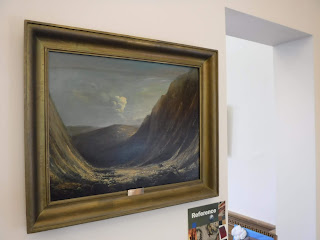Summer is such a big topic that it takes several blogs and two displays at the Conway Public Library to cover it. While our previous blog here focused on summer attractions, this blog focuses on accommodations. The display can be found downstairs near the entrance to the Henney History Room.
Historically vacation lodging developed into two extremes - from fancy Grand Hotels to rustic summer cottages. Interestingly, a pair of books by the same author, Dr. Bryant Tolles explore these topics in great depth. Please feel free to check these books out from the Conway Public Library's circulation desk. You may also want to visit Plymouth State University's current exhibit on the Grand Hotels which Dr. Tolles co-curated with Cynthia Robinson. See the link for that exhibit here.
A new trend combines these two extremes into the "glamping" style of roughing it in high style. Perhaps this will be the subject of Dr. Tolles next book?
Our first summer blog started with a remarkable poster listing "Places of Interest" on display at the Intervale Scenic Vista from over one hundred years ago. It lists a number of both tourist attractions (discussed in the previous blog) and places to stay including Potter's Farm, the Glen House, the Crawford House, the Fabyan House and the Profile House. I believe that the poster itself was originally made for the Intervale House.
The Conway Public Library has a wide range of resources to learn about these early lodging establishments. Unlike most of today's motels and hotels, which are largely just places to sleep while you explore the attractions around you, these earlier tourist resorts were considered attractions in themselves and a unique culture and traditions developed around them.
A few clues to these traditions can be glimpsed through souvenirs and mementos of the Grand Hotels, one of the earliest which was on the northwest corner of the intersection of Washington and Main, only a stone's throw from the Conway Public Library. All that remains of it now is a cellar hole and the fragments of history at the library and the Conway Historical Society. For more details see this previous blog on Conway Corner.
This small metal item advertises fine views, walks and drives, pure spring water, fine livery, long distance telephone and a post office (click on images to enlarge them). Can you guess what this tray was for? Hint: It played an important role in period etiquette.
See if you can find the Conway House in the bird's eye view of Conway from 1896 on a nearby wall. (Hint: it is listed as #19)
You can also find #20, the Pequawket House, now the site of Conway's Kennett Middle School.
Look around the library for this painting:
This was both a tourist attraction with a terrible story to tell and later a hotel. Look closely so see if you can find the building, the road and a pair of people walking through the valley (click on image to enlarge it).
For more information on this painting see our previous blog here.
The late, great David Emerson, longtime Curator of the Henney History Room, wrote two books on White Mountain hotels and left an extensive set of research files and additional photos on the subject. Using the work of Tolles and Emerson a pattern emerges that applies well to the summer lodging in Conway.
One can argue that basis of our tourism industry was, and remains, the natural landscape. The phrase which holds the most prominent place at the top of the photo on the metal item above is "Fine Views - Walks and Drives." The rest of the promotional tag lines focus on comfort and convenience.
Another souvenir links us to a nearby location in that landscape.
Birchmont was located on Sunset Hill where the Red Jacket is today and the view from there was one of the most important in the history of White Mountain Art. See if you can find a print of that view here at the library.
For more information on this view see here. A number of years ago Dr. Tolles edited an important project that resulted in an exhibit, symposium and publication. Featured on the cover was a copy of the painting by John Frederick Kensett of Mount Washington from Conway.
Over the years this and related viewpoints were canonized into a set of sites that were mapped out and detailed in numerous guidebooks from small pocket size "red" books to large parlor sized books such as Picturesque America. See this previous blog on the red guide books here.
As always, for more details on the history of summer in the area, or any historical subject, contact us at the Conway Public Library's Henney History Room.











No comments:
Post a Comment